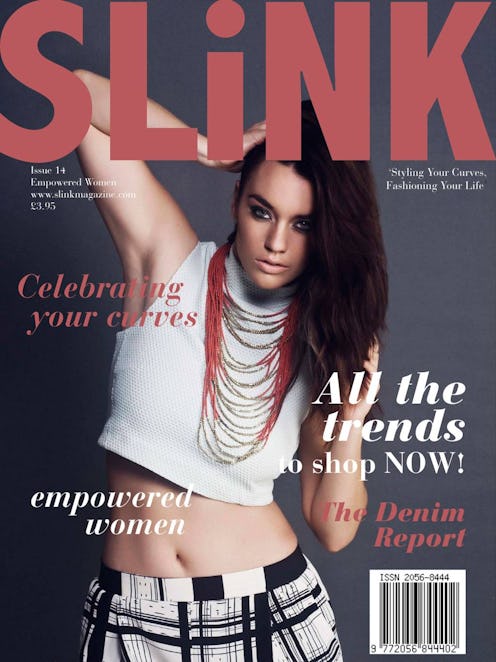
Big news. Great news. Wonderful news. As of today, SLiNK Magazine — which has, since it's founding in 2011, been limited to online parameters and print sales exclusive to its website — is being stacked across shelves in 15 different countries. Yes, you heard that right: a publication geared at plus-size women, whose primary goal has always been to encourage positive body image and self-love amongst all women via content that spans news, feature writing, interviews and editorials, will now be sold beside your Teen Vogue or Cosmopolitan. This is a memorable and, quite frankly, remarkable achievement considering the non-inclusivity that permeates our everyday lives. And let's not forget that SLiNK is the UK's first plus-size fashion magazine (ever!), and has achieved all this in just three years.
But, unsurprisingly perhaps, one of the first questions that pops into people's minds when such news surfaces is: Is this healthy?
When interviewed by The Independent's Linda Sharkey, SLiNK's editor Rivkie Baum addressed the unavoidable accusation, and questionable argument, that a plus-size magazine "would promote unhealthy bodies as much as regular fashion publications." Baum's response was solid:
"We are extremely conscious of our responsibility to promote a healthy body image both physically and mentally. In our next issue, we are introducing a new healthy eating and fitness column to further back this. But what we are also aware of is that health doesn't come in one dress size and there are numerous factors that play a part in our wellbeing... While many magazines promote crash diets, which are extremely unhealthy, we believe that empowering women to feel confident and good about themselves at whatever size they are can have knock on effects on their overall health and lifestyle choices. It's about promoting health and happiness without suggesting it can only be achieved at one dress size."
This question of health gets brought up whenever a person (or organization) deviates from the widely socially accepted perceptions of weight and health. (Of course, it doesn't usually get asked of a person or organization that un/intentionally promotes eating disorders and/or properly life-threatening perceptions of body image.) Whenever someone involved in fat activism/acceptance, body confidence or (dare I say it) fat pride vocalizes an opinion or puts out a publication or a photo shoot for the world to see, the concern trolls come out; the medical textbooks come out; the fat-shamers come out. And the discussion of health usually goes something like this:
Complainant: Being fat is unhealthy! You're encouraging obesity and promoting a disease! You're also gross.
Defense: We don't promote obesity. We promote mental and emotional health, and the reality that health can exist at most sizes.
Alternate Defense: Not everyone who is fat wants to be fat. Many of us suffer from genetic predispositions. Many of us have PCOS. Many of us have slow metabolisms and flawed thyroids.
When it comes to discussion of fat acceptance and size-inclusivity, the reality is that health is never left behind. And I get it. I get that notions of healthy versus unhealthy have been thrown at us since elementary health education courses. I know that the idea that fat is always a bad, undesirable thing is so engrained into our psyches that most of us don't even realize we fat shame. But there is a more important conversation to be had, and it excludes health.
The reality is that magazines like SLiNK (along with plus-size bloggers and body-pos activists and plus-size models) are a way forward in spreading tolerance. Fat acceptance, at its core, is not about trying to convince anyone that all fat people are healthy (because the truth is that health just isn't a size, as Baum notes. And that should be common knowledge).
To my mind's eye, fat acceptance is about eradicating the taught fat shaming in our world. It's about acknowledging that beauty is an individual notion, and that what is unattractive to one person may be stunning to another. It should be about spreading awareness about the fact that not everyone who is fat is fat because they have PCOS or a slow metabolism (although, yes, many are). Some people are fat because they want to be fat. Because they feel beautiful at a higher weight. And people need to realize that that's OK. Because it's their decision. And perhaps something perceived as unhealthy physically actually isn't. Or even if it is, that perhaps emotional and/or psychological health is/are just as valuable.
I applaud SLiNK for moving forward in its spreading of body confidence and self-love. But it saddens me that they will be met with these same, old, boring accusations. And it saddens me that when someone gets asked, "Is this healthy," they so often feel the need to turn around and say, "Well, it's not my fault. It's my metabolism!" While I know that is very true for some, I don't think the way to achieve a higher level of tolerance is to shift the blame onto yet another health-related topic of conversation.
What we need is awareness, tolerance and acceptance. We need to let a fashion magazine be a fashion magazine — but also a platform for the deconstruction of antiquated and harmful ideologies of beauty. And if a publication wants to cater predominantly to plus-size women (or women who have been delineated in some way), we need to let that happen, too. We need more positive imagery out there — more realistic imagery out there. And very often, we need to step aside, understand that our personal views are not universal and let others monitor their own lives.
Images: SLiNK